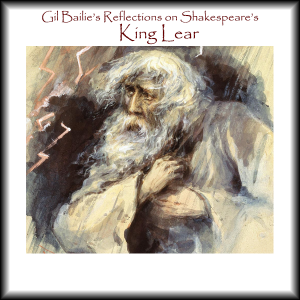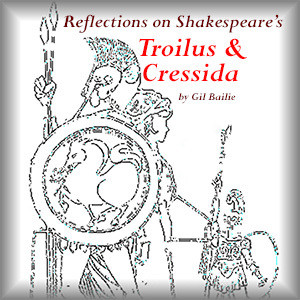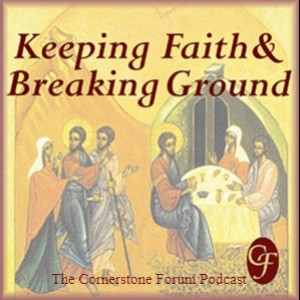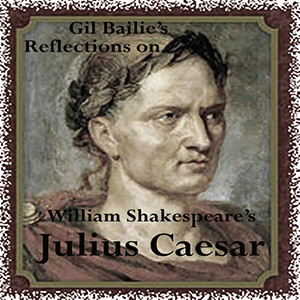Episodes

Tuesday Dec 28, 2021
Tuesday Dec 28, 2021
Under the theme of ’Worthy Stories confused with Dubious Plots’ this exploration of one of the later plays of Shakespeare follows the crisis King Lear’s abdication precipitates and the cost to extricate himself from the ‘plot’ in order to enter the larger ‘Story’. Using the insights of René Girard’s mimetic theory, Gil Bailie brings the inner dynamics of Shakespeare’s play to life.

Monday Dec 27, 2021
Monday Dec 27, 2021
Troilus & Cressida reveals William Shakespeare in a dark mood. Written shortly after his play Julius Caesar, it reveals another episode of a culture under stress – this time by way of Homer’s epic story of the war between the Greeks and Trojans. Using the insights of René Girard’s mimetic theory, Gil Bailie brings the inner dynamics of Shakespeare’s play to life.

Sunday Dec 26, 2021
Sunday Dec 26, 2021
Troilus & Cressida reveals William Shakespeare in a dark mood. Written shortly after his play Julius Caesar, it reveals another episode of a culture under stress – this time by way of Homer’s epic story of the war between the Greeks and Trojans. Using the insights of René Girard’s mimetic theory, Gil Bailie brings the inner dynamics of Shakespeare’s play to life.

Saturday Dec 25, 2021
Saturday Dec 25, 2021
Troilus & Cressida reveals William Shakespeare in a dark mood. Written shortly after his play Julius Caesar, it reveals another episode of a culture under stress – this time by way of Homer’s epic story of the war between the Greeks and Trojans. Using the insights of René Girard’s mimetic theory, Gil Bailie brings the inner dynamics of Shakespeare’s play to life.

Friday Dec 24, 2021
Friday Dec 24, 2021
Troilus & Cressida reveals William Shakespeare in a dark mood. Written shortly after his play Julius Caesar, it reveals another episode of a culture under stress – this time by way of Homer’s epic story of the war between the Greeks and Trojans. Using the insights of René Girard’s mimetic theory, Gil Bailie brings the inner dynamics of Shakespeare’s play to life.

Thursday Dec 23, 2021
Thursday Dec 23, 2021
Troilus & Cressida reveals William Shakespeare in a dark mood. Written shortly after his play Julius Caesar, it reveals another episode of a culture under stress – this time by way of Homer’s epic story of the war between the Greeks and Trojans. Using the insights of René Girard’s mimetic theory, Gil Bailie brings the inner dynamics of Shakespeare’s play to life.

Wednesday Dec 22, 2021
Wednesday Dec 22, 2021
In 1940 when Europe was being ravaged by war a 33 year old W. H. Auden penned his ‘New Year Letter’ to a friend. In 1990 Gil Bailie spent some time reflecting on this long poem full of erudite references to historical, literary, political and religious subjects.
“We are, I know not how, double in ourselves, so that what we believe we disbelieve and cannot rid ourselves of what we condemn.” – Montainge

Tuesday Dec 21, 2021
Tuesday Dec 21, 2021
In 1940 when Europe was being ravaged by war a 33 year old W. H. Auden penned his ‘New Year Letter’ to a friend. In 1990 Gil Bailie spent some time reflecting on this long poem full of erudite references to historical, literary, political and religious subjects.
“We are, I know not how, double in ourselves, so that what we believe we disbelieve and cannot rid ourselves of what we condemn.” – Montainge

Monday Dec 20, 2021
Monday Dec 20, 2021
In 1940 when Europe was being ravaged by war a 33 year old W. H. Auden penned his ‘New Year Letter’ to a friend. In 1990 Gil Bailie spent some time reflecting on this long poem full of erudite references to historical, literary, political and religious subjects.
“We are, I know not how, double in ourselves, so that what we believe we disbelieve and cannot rid ourselves of what we condemn.” – Montainge

Sunday Dec 19, 2021
Sunday Dec 19, 2021
Gil Bailie examines William Shakespeare’s Julius Caesar through the lens of René Girard. Shakespeare’s play looks at the volatile transition from republican Rome to Imperial Rome. The unsuccessful attempt to sacralize the murder of Caesar by the conspirators leads to an escalating chaos. The conflict swirling around Brutus and Cassius with the conspirators on the one hand and Antony and Octavius on the other depicts aspects of the mimetic crisis violence provokes. Shakespeare created a masterful display of mimetic doubling and conflictual undifferentiation in Acts 4 & 5 showing Brutus and Cassius side by side with Antony and Octavius.

Keeping Faith & Breaking Ground
Without Christianity neither the nature of the present crisis of culture nor the meaning of history itself can be properly comprehended. If the Christian revelation is to come to our aid in this moment of peril, we must learn to account for its sweeping claims in ways that are faithful to Church teachings, intellectually cogent, morally rigorous, charitable, anthropologically sound, and undeterred by the moribund spirit of our age.



